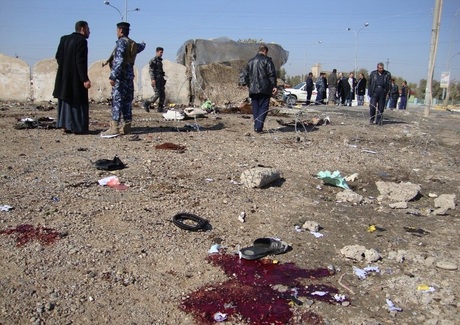Suicide Truck Bomb Kills 9 as Iraq Unrest Spikes
إقرأ هذا الخبر بالعربية
A suicide truck bomber killed nine people at a police headquarters on Monday as data showed March was Iraq's deadliest month since August, raising fears of a surge in violence leading up to elections.
The latest attack, in Saddam Hussein's hometown of Tikrit, comes as Iraq marks 10 years since the U.S.-led invasion of the country that intended to oust Saddam and install a stable, democratic ally in the Middle East but instead unleashed brutal violence and endless political disputes.
The attacker detonated the tanker truck at a police headquarters in Tikrit, 160 kilometers (100 miles) north of Baghdad, killing nine people and wounding 28, according to Mohammed Hassan Attiya, the head of the security committee within the provincial council of Salaheddin, of which Tikrit is the capital.
Among the victims were eight policemen who died and 25 who were wounded, Attiya said.
Also north of the capital in the town of Tuz Khurmatu, gunmen wounded the mayor and his two bodyguards, officials said.
No group immediately claimed responsibility for the Tikrit attack, but Sunni militants linked to al-Qaida often use suicide bombers and vehicles packed with explosives to target security forces and officials in a bid to destabilize the country.
The bombing comes ahead of provincial elections scheduled for April 20, due to be held in 12 of Iraq's 18 provinces, the country's first polls since a parliamentary vote in March 2010.
"Because we are approaching elections, which are a key event in the country, this is pushing terrorist groups ... to carry out maximum damage against internal security," a senior security official told Agence France Presse, speaking on condition of anonymity.
"They are aiming to hinder the elections."
Questions have been raised about the credibility of the polls as they have been postponed in two provinces roiled by months of protests, and 11 candidates have been killed, according to an AFP tally.
Officials cited security threats to candidates and election officials in justifying the delay in Anbar and Nineveh province, but diplomats have voiced concern over the move.
"The fact is that while security has been put forward as a rationale for that postponement, no country knows more about voting under difficult circumstances than Iraq," U.S. Secretary of State John Kerry said on a surprise visit to Baghdad last month.
The vote is seen as a key barometer of support for Prime Minister Nouri al-Maliki as he grapples with criticism from within his unity cabinet and protests in the minority Sunni Arab community.
Though violence remains high by international standards, Iraq's military and police are consistently described by Iraqi and American officials as capable of maintaining internal security, but are not yet fully able to protect the country's borders, airspace and maritime territory.
Figures compiled by AFP and based on reports from security and medical officials, meanwhile, showed that March was the deadliest month in Iraq since August with 271 people killed and 906 wounded in attacks.
The death toll was sharply higher than the toll for February, when 220 people were killed and 571 were wounded.
In last month's bloodiest day, 56 people were killed in a spate of bombings and shootings nationwide on March 19, marking the 10th anniversary of the U.S.-led invasion of Iraq.
Iraq has largely eschewed any formal ceremonies marking the date of the invasion, but events are likely to be held on April 9, which marks the day Baghdad fell and is typically reserved as a public holiday.



